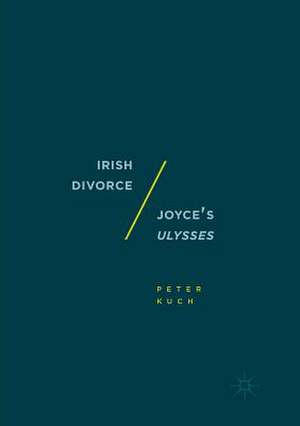Irish Divorce / Joyce's Ulysses
Autor Peter Kuchen Limba Engleză Paperback – 27 iul 2018
Preț: 268.45 lei
Nou
Puncte Express: 403
Preț estimativ în valută:
51.37€ • 52.99$ • 42.87£
51.37€ • 52.99$ • 42.87£
Carte tipărită la comandă
Livrare economică 27 martie-10 aprilie
Preluare comenzi: 021 569.72.76
Specificații
ISBN-13: 9781349957552
ISBN-10: 1349957550
Pagini: 289
Ilustrații: XXVIII, 289 p.
Dimensiuni: 148 x 210 mm
Greutate: 0.38 kg
Ediția:Softcover reprint of the original 1st ed. 2017
Editura: Palgrave Macmillan US
Colecția Palgrave Macmillan
Locul publicării:New York, United States
ISBN-10: 1349957550
Pagini: 289
Ilustrații: XXVIII, 289 p.
Dimensiuni: 148 x 210 mm
Greutate: 0.38 kg
Ediția:Softcover reprint of the original 1st ed. 2017
Editura: Palgrave Macmillan US
Colecția Palgrave Macmillan
Locul publicării:New York, United States
Cuprins
Reading Sex, Love, and Divorce in Ulysses as Certain Uncertainties.-“Not now”–Breakfast at No. 7.- Bloom in the Sexualized City.- “Bloowho” and Silence.- Sex, Pleasure, Guilt, and Divorce.- Money and Divorce.- Bloom Enters the Bed.- Will They or Won’t They?
Recenzii
“His research and his critical readings are contributive, dense, and delicious. … I am pleased to give this book full credit for all its admirable and useful about it, while neither ignoring nor minimizing problems that might, in time, seem merely cosmetic.” (Margot Gayle Backus, The Canadian Journal of Irish Studies, Vol. 42, 2019)
“It’s central thesis is quite simple: contrary to what had been thought, divorce in Ireland was a ‘realistic option’ for Bloom or Molly should they have chosen to seek it. … It might be thought that Kuch, professor of Irish studies at the University of Otago, New Zealand, is engaging in speculation about mere what-ifs … . Kuch pursues this theme through a labyrinth of legal cases, and throughout Ulysses, in a hugely impressive way.” (Terence Killeen, The Irish Times, irishtimes.com, June, 2017)
Notă biografică
Peter Kuch studied with Richard Ellmann and John Kelly at Oxford. Since then he has held posts at the University of Newcastle, Australia; Université de Caen, France; and the University of New South Wales, Australia. He has also held Fellowships at the Australian National University; Trinity College, Dublin; and Notre Dame, Indiana. At present he is the inaugural Eamon Cleary Professor of Irish Studies at the University of Otago in New Zealand.
Textul de pe ultima copertă
This engrossing, ground-breaking book challenges the long-held conviction that prior to the second divorce referendum of 1995 Irish people could not obtain a divorce that gave them the right to remarry. Joyce knew otherwise, as Peter Kuch reveals—obtaining a decree absolute in Edwardian Ireland, rather than separation from bed and board, was possible. Bloom’s “Divorce, not now” and Molly’s “suppose I divorced him”—whether whim, wish, fantasy, or conviction—reflects an Irish practice of petitioning the English court, a ruse that, even though it was known to lawyers, judges, and politicians at the time, has long been forgotten. By drawing attention to divorce as one response to adultery, Joyce created a domestic and legal space in which to interrogate the sometimes rival and sometimes collusive Imperial and Ecclesiastical hegemonies that sought to control the Irish mind. This compelling, original book provides a refreshingly new frame for enjoying Ulysses even as it prompts thegeneral reader to think about relationships and about the politics of concealment that operate in forging national identity
Caracteristici
Argues that divorce in Edwardian Ireland was both possible and practiced, drawing from textual evidence and legal cases of the period Interweaves themes of love, marriage, and sexuality in Ulysses within a broader discussion of Irish law, religion, and national identity Illustrates the impact of religious and imperial power structures in Edwardian Ireland and how Joyce questions these structures in Ulysses
